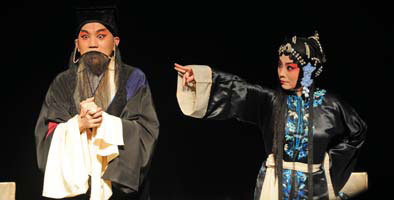Dynamic Kunqu opera powers into New York
Updated: 2012-05-18 10:46
By Kelly Chung Dawson in New York (China Daily)
|
|||||||||
|
Kunqu is one of the oldest surviving forms of Chinese opera and renowned for its beautiful blend of acting, dance and music. Provided to China Daily |
As part of its Year of China, the Asia Society has partnered with the Chinese Ministry of Culture to offer three performances by 22 members of the award-winning Shanghai Kunqu Opera troupe in New York this weekend.
Kunqu is one of the oldest surviving forms of Chinese opera, dating to the 14th century and renowned for its beautiful blend of acting, dance and music. The New York performances of Lanke Mountain and The Monkey King will be accompanied by an instrumental ensemble featuring six musicians on strings, woodwinds and percussion.
"We are so excited and proud to be here," Wang Junxing, who will play the Monkey King in a Sunday matinee performance for children, told China Daily. "We are really grateful to the Asia Society and we are hoping to represent at least a little bit of Chinese culture to Western audiences, because there are so many cultures even within China."
The group arrived Thursday night and will fly out Monday. Although most have never been to the US, their main focus will be on the performances, said Zhang Weiwei, who plays a marshal in Lanke Mountain.
Rachel Cooper, the Asia Society's director of cultural programs and performing arts, said Kunqu can easily be interpreted for the modern stage.
"What's particularly interesting to me about these stories is the transit between past, present and future," she said in an interview. Cooper pointed to the story of Lanke Mountain, in which a woman scorns a poor scholar for failing the imperial exam.
"It has elements of a Confucian morality tale, but if you look at new wealth in China today, it can also be read as a cautionary tale about loyalty, family and education. You can read it as 14th century, or you can read it as right now. I'm hoping that Western audiences will get a new view on the world of theater through seeing this extraordinary company."
Much of the troupe is in their 20s or younger, Cooper said.
"What's exciting to me is to see a form like Kunqu performed by a younger generation. It means that something from the past can represent both old China and still be contemporary and relevant to a new generation. And yet, for some of these performers it is also a family legacy. They carry their Chinese-ness and the history of the past."
Zhang spoke about growing up in a family of Kunqu performers.
"I feel so honored to be a part of this beautiful art form, and it's something I feel passionate about as a result of my family," the performer said. "I have always loved it, and I want to preserve the traditional art."
Kunqu was developed during the late Yuan Dynasty (1271-1368), and has been listed as one of the "Masterpieces of the Oral and Intangible Heritage of Humanity" by Unesco since 2001.
In fact, many of the group's fans are of college age, Wang said. "Our fan base is actually quite young, and of course the older generations still feel close to it," he said. "We don't worry about it going out of fashion. It's surprisingly powerful.
"Kunqu is a slow art form, and when you see the performance you don't necessarily feel the impact immediately. To me, it's like drinking tea; it feels subtle but later you feel its strength in the impression it leaves."
As Western audiences become more receptive to Chinese art forms, Wang expects Kunqu's popularity to grow.
"I truly believe that not only Eastern audiences but also Western audiences are capable of understanding and absorbing the beauty of Kunqu," he said.
kdawson@chinadailyusa.com
(China Daily 05/18/2012 page1)

 Relief reaches isolated village
Relief reaches isolated village
 Rainfall poses new threats to quake-hit region
Rainfall poses new threats to quake-hit region
 Funerals begin for Boston bombing victims
Funerals begin for Boston bombing victims
 Quake takeaway from China's Air Force
Quake takeaway from China's Air Force
 Obama celebrates young inventors at science fair
Obama celebrates young inventors at science fair
 Earth Day marked around the world
Earth Day marked around the world
 Volunteer team helping students find sense of normalcy
Volunteer team helping students find sense of normalcy
 Ethnic groups quick to join rescue efforts
Ethnic groups quick to join rescue efforts
Most Viewed
Editor's Picks

|

|

|

|

|

|
Today's Top News
Health new priority for quake zone
Xi meets US top military officer
Japan's boats driven out of Diaoyu
China mulls online shopping legislation
Bird flu death toll rises to 22
Putin appoints new ambassador to China
Japanese ships blocked from Diaoyu Islands
Inspired by Guan, more Chinese pick up golf
US Weekly

|

|








